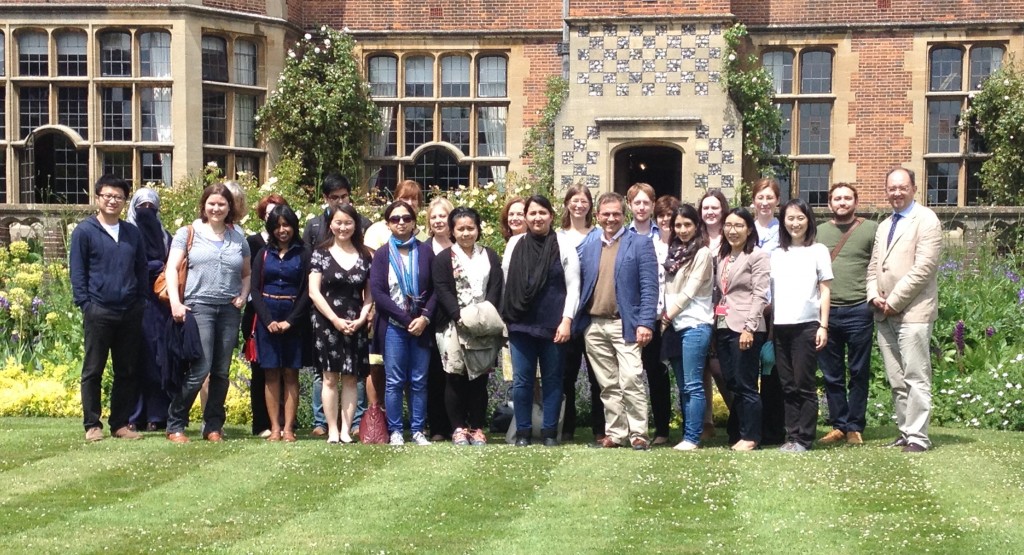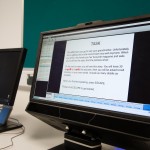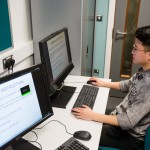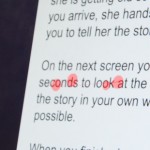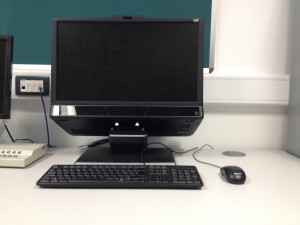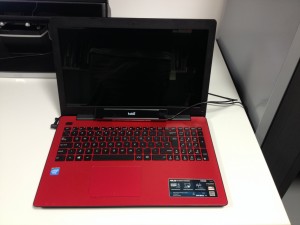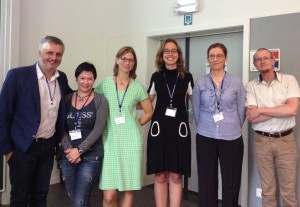The Lancaster Linguistics Eye-tracking Lab is based in the Department of Linguistics and English Language at Lancaster University and is dedicated to research that makes use of eye-tracking as part of its methodology. Our facilities are used by staff, as well as by PhD students working in the areas of language testing, second language acquisition, and psycholinguistics.
The Eye-tracking Lab hosts speakers and reading groups via the Language Testing Research Group and the Second Language Learning and Teaching Research Group.
Projects
Have a look at our research projects involving eye-tracking!
A number of staff projects and PhD student projects in the areas of language testing, second language acquisition, and psycholinguistics make use of eye-tracking as part of their methodology.
Facilities
Our facilities include a Tobii Desktop TX300 eye-tracker which has a high sampling rate and tolerance of large head movements, and a Tobii mobile eye tracker X2-60 which can easily be used out of the lab. We also have E-prime software for computerised experiment design.
Conferences
Colloquium on eye-tracking and other methodological advances
On 31st August 2017, Marije Michel (Lancaster University) and Andrea Révész (IoE, University College London) organized the Colloquium ‘Methodological advances in investigating L2 writing processes’ at the EuroSLA conference in Reading (UK). The colloquium included the following presentations:
-
Deployable concurrent eye tracking and keystroke logging technology forresearch into L2 writing processes (Evgeny Chukharev-Hudilainen & Aysel Sarıcaoğlu)
-
The role of task complexity in writing processes: Evidence from key-strokelogging and automatic text analyses (Jongbong Lee)
-
Understanding CALF development by examining writers’ processes: Evidence from keystroke logging and stimulated recall (Jungmin Lim, Magda Tigchelaar, & Charlene Polio)
-
Triangulating keystroke-logging, eye-tracking and stimulated recall to explore writing processes (Andrea Revesz, Marije Michel & MinJin Lee)
-
Coding of writing processes in think-aloud protocols (Lena Vasylets & Roger Gilabert)
-
Looking into attentional processes while writing: Research focus and research instruments (Rosa Manchon)
Eye-tracking Workshop
On 23rd August 2017, Marije Michel (Lancaster University) and Breffni O’Rourke (Trinity College Dublin) gave a workshop on ‘Eye-tracking in CMC research: Insights and challenges’. at the EuroCALL conference in Southampton (UK).
Eye-tracking Colloquium
On 18th September 2015, Marije Michel (Lancaster University) and Aline Godfroid (Michigan State University) organized the Colloquium ‘Eye-movements during task-based performance: What can we learn?’ at the TBLT conference in Leuven (Belgium). The colloquium included the following presentations:
- Exploring the visual-dynamic and linguistic conceptualisation traces in task-based performance (Lena Vasylets and Roger Gilabert)
- Eye movements during L2 written computer chat interaction (Marije Michel & Bryan Smith)
- The effect of different types of glosses on learners’ intake of new words during reading (Frank Boers, Paul Warren, Anna Siyanova, and Gina Grimshaw)
- Cognitive processing during reading-test completion: Insights from eye tracking (Tineke Brunfaut & Gareth McCray)
Eye-tracking Research Day
On 18th June 2015, we held an Eye Tracking Research day, together with CRELLA (University of Bedfordshire). The organizers were Stephen Bax (CRELLA) & Tineke Brunfaut (Lancaster University). The research day included the following talks:
- Cognitive processes in reading (Safia Sheraz)
- Attentional processing of input in different input conditions: an eye tracking study (Bimali Indrarathne and Judit Kormos)
- Cognitive processes in reading-into writing tasks (Nicola Latimer)
- Eye movements during L2 written computer chat interaction (Marije Michel)
- Modelling L2 reading proficiency using eye-tracking measures (Tineke Brunfaut and Gareth McCray)
- Reading processes in GEPT reading tests (Sathena Chan and Stephen Bax)
- Stimulated-recall interviews and eye tracking (Nathanial Owen)
- Computer Science: two projects (Haiming Liu and Asad Ullah)
